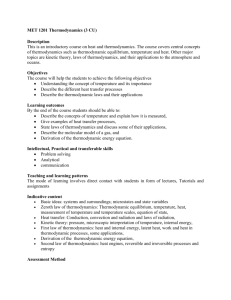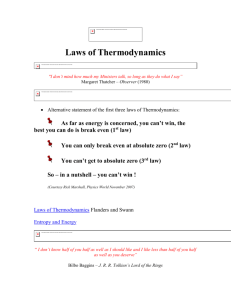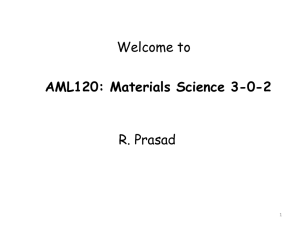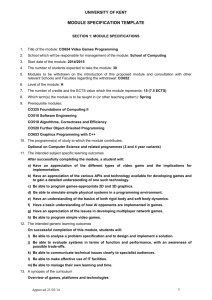module specification template
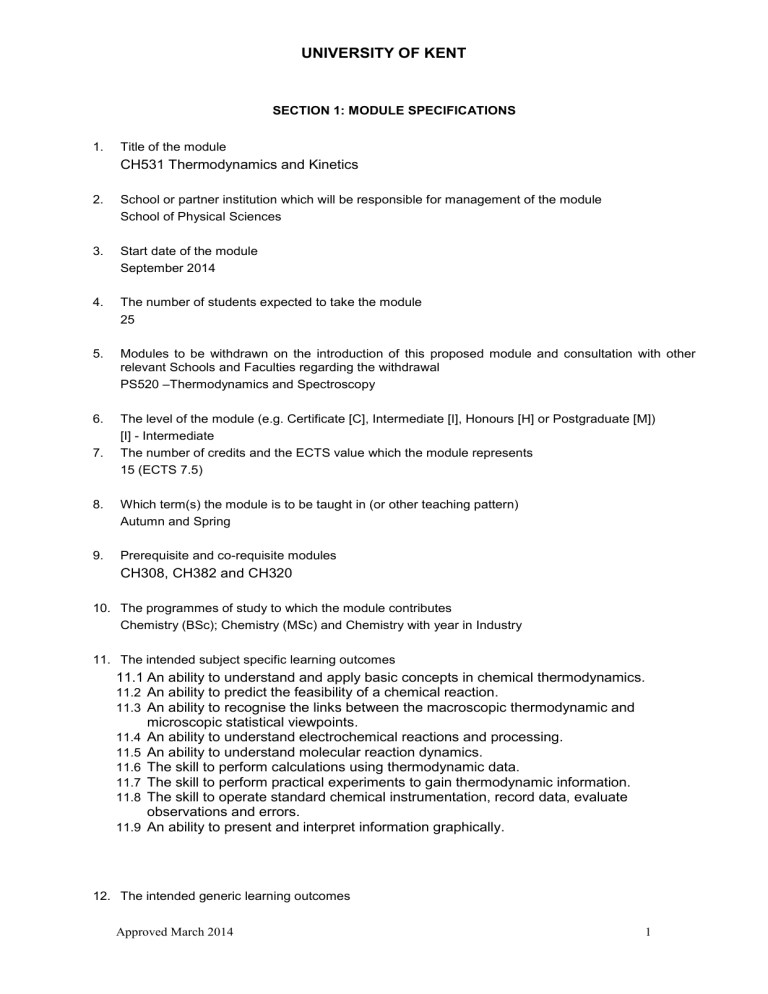
UNIVERSITY OF KENT
SECTION 1: MODULE SPECIFICATIONS
1. Title of the module
CH531 Thermodynamics and Kinetics
2. School or partner institution which will be responsible for management of the module
School of Physical Sciences
3. Start date of the module
September 2014
4. The number of students expected to take the module
25
5. Modules to be withdrawn on the introduction of this proposed module and consultation with other relevant Schools and Faculties regarding the withdrawal
PS520 –Thermodynamics and Spectroscopy
6. The level of the module (e.g. Certificate [C], Intermediate [I], Honours [H] or Postgraduate [M])
[I] - Intermediate
7. The number of credits and the ECTS value which the module represents
15 (ECTS 7.5)
8. Which term(s) the module is to be taught in (or other teaching pattern)
Autumn and Spring
9. Prerequisite and co-requisite modules
CH308, CH382 and CH320
10. The programmes of study to which the module contributes
Chemistry (BSc); Chemistry (MSc) and Chemistry with year in Industry
11. The intended subject specific learning outcomes
11.1 An ability to understand and apply basic concepts in chemical thermodynamics.
11.2 An ability to predict the feasibility of a chemical reaction.
11.3 An ability to recognise the links between the macroscopic thermodynamic and microscopic statistical viewpoints.
11.4 An ability to understand electrochemical reactions and processing.
11.5 An ability to understand molecular reaction dynamics.
11.6 The skill to perform calculations using thermodynamic data.
11.7 The skill to perform practical experiments to gain thermodynamic information.
11.8 The skill to operate standard chemical instrumentation, record data, evaluate
11.9 observations and errors.
An ability to present and interpret information graphically.
12. The intended generic learning outcomes
Approved March 2014 1
UNIVERSITY OF KENT
12.1 Problem-solving skills, an ability to formulate problems in precise terms and to identify key issues, and the confidence to try different approaches in order to make progress on challenging problems.
12.2 Analytical skills – associated with the need to pay attention to detail and to develop an ability to manipulate precise and intricate ideas, to construct logical arguments and to use technical language correctly.
12.3 Personal skills – the ability to work independently, to use initiative, to organise oneself to meet deadlines and to interact constructively with other people.
13. A synopsis of the curriculum
Lectures (24 lectures);
I)
II)
Thermodynamics lectures (14 lectures)
1) Revision of stage one material (CH308), First and Second Law, concept of internal energy, enthalpy and entropy.
2) Gibbs ’ Energy and its Applications – formation energy, dependence of temperature and pressure, Gibbs ’ energy and phase equilibria-Clausius-
Clapeyron’s equation
3) Non-electrolyte solutions, thermodynamic of mixing, binary mixtures and volatile liquids, real solutions, Raoult’s and Henry’s law. Colligative properties.
4) Electrolyte solutions. Thermodynamics of ions in solutions, DebyeHückel theory. Salting-in and Salting-out effect, Non-ideal mixing
5) Chemical Equilibrium, influence of temperatue, pressure and catalyst, van’t Hoff equation.
6) Statistical Thermodynamics; Macrostate and microstate, Boltzmann distribution law, partition function, molecular partition function, relationship partition function and thermodynamic quantities.
Electrochemistry lectures (3 lectures)
1) Electrochemical cell, thermodynamics of electrochemical cell. Types of electrochemical cells
2) The electrode-solution interface. Double layer formation
3) The rate of charge transfer.
III) Kinetics Lectures (7 lectures)
1) Collision theory, diffusion controlled reactions and the material balance equation.
2) Transition state theory, reaction coordinate, potential energy surface thermodynamics of transition state theory
3) Electron transfer in homogenous systems, rate of transfer, theory of transfer.
14. Indicative Reading List
(i) P.W Atkins, Physical Chemistry, (ii) R. Chang , Physical Chemistry for the Chemical and
Biological Sciences
15. Learning and Teaching Methods, including the nature and number of contact hours and the total study hours which will be expected of students, and how these relate to achievement of the intended module learning outcomes
Learning and Teaching Methods:
lectures given by a variety of teachers (24hrs); practical lab classes (18 hrs); assignments (50hrs); personal study using textbooks, and other self-study material (58 hrs).
The number of personal study hours, including assignments and write up of lab reports (90 hrs)
Approved March 2014 2
UNIVERSITY OF KENT
Total number of study hours 150 hrs
This information is particularly important for KIS requirements.
Achievement of module learning outcomes:
Lectures (11.1-11.5,11.9, 12.1,12.2)
Practical lab classes (11.1-11.9, 12.1-12.3)
Assignments (11.1-11.9; 12.1-12.3)
Self-studies (11.1-11.9; 12.1-12.3)
16. Assessment methods and how these relate to testing achievement of the intended module learning outcomes
40% coursework: 3 assignment (15%), practicals (25%);
Assessment : coursework involving problem solving (11.1-11.5, 11.9, 12.1-12.3),
practical laboratory skills (11.1-11.9, 12.1-12.3).
60% final (written unseen) exam (11.1-11.6, 11.9, 12.1-12.3)
17. Implications for learning resources, including staff, library, IT and space
Lecture room,
Chemical laboratory
Library resources (literature and space) for self-study
Moodle for lecture notes and on-line assignments.
18. The School/Collaborative Partner (delete as applicable) recognises and has embedded the expectations of current disability equality legislation, and supports students with a declared disability or special educational need in its teaching. Within this module we will make reasonable adjustments wherever necessary, including additional or substitute materials, teaching modes or assessment methods for students who have declared and discussed their learning support needs. Arrangements for students with declared disabilities will be made on an individual basis, in consultation with the
University’s disability/dyslexia support service, and specialist support will be provided where needed.
19. Campus(es) where module will be delivered:
Canterbury campus
If the module is part of a programme in a Partner College or Validated Institution, please complete the following:
20. Partner College/Validated Institution: N/A
21. University School responsible for the programme: N/A
Approved March 2014 3
UNIVERSITY OF KENT
SECTION 2: MODULE IS PART OF A PROGRAMME OF STUDY IN A UNIVERSITY SCHOOL
Statement by the School Director of Learning and Teaching/School Director of Graduate Studies
(as appropriate): "I confirm I have been consulted on the above module proposal and have given advice on the correct procedures and required content of module proposals"
................................................................
Director of Learning and Teaching/Director of
Graduate Studies (delete as applicable)
…………………………………………………
..............................................
Date
Print Name
Statement by the Head of School: "I confirm that the School has approved the introduction of the module and, where the module is proposed by School staff, will be responsible for its resourcing"
................................................................. ..............................................
Head of School
…………………………………………………….
Print Name
Date
SECTION 3: MODULE IS PART OF A PROGRAMME IN A PARTNER COLLEGE OR VALIDATED
INSTITUTION
(Where the module is proposed by a Partner College/Validated Institution)
Statement by the Nominated Officer of the College/Validated Institution (delete as applicable): "I confirm that the College/Validated Institution (delete as applicable) has approved the introduction of the module and will be responsible for its resourcing"
................................................................. ..............................................
Date Nominated Responsible Officer of Partner
College/Validated Institution
………………………………………………….
Print Name
…………………………………………………..
Post
………………………………………….
Partner College/Validated Institution
Module Specification Template
Last updated February 2013
Approved March 2014 4
